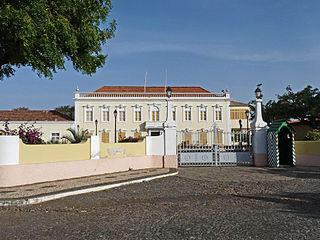
Mindelo is a port city in the northern part of the island of São Vicente in Cape Verde. Mindelo is also the seat of the parish of Nossa Senhora da Luz, and the municipality of São Vicente. The city is home to 93% of the entire island's population. Mindelo is known for its colourful and animated carnival celebrations, with roots in Portuguese traditions.

Sal is an island in Cape Verde. It belongs to the northern group of islands, called Barlavento ("windwards"), and comprises a single administrative division, the municipality of Sal. Its seat is the city of Espargos.

Espargos is the capital and main commercial centre of the island and municipality of Sal, Cape Verde. The city is situated in the heart of the island.

The Cape Verdean Football Federation is the governing body of football in Cape Verde. It was founded in 1982, affiliated to FIFA in 1986 and to CAF in 2000. It organizes the national football league and the national team.

Estádio Marcelo Leitão is a multi-use stadium in Sal Island, Cape Verde. It is used mostly for football matches and now track and field and has a capacity of 8,000 people. It is named for Marcelo Leitão, one of the two main features on the island, the other is a square located in Santa Maria. The stadium is owned by the municipality of Sal and still does as the municipality has yet to split into two. The stadium are operated by the Sal Regional Football (Soccer) and Athletic associations. It is the home stadium of Espargos teams, Académico do Aeroporto and others based in a neighborhood Juventude and recently Chã de Matias, Gaviões, Jovens Unidos of Ribeira Funda and Pretória, it is also home to the island's club Académica do Sal. The ground is made of artificial grass, its area is 105 x 68 meters. Its location is south of the road connecting the east of the city with the road encircling most of the city. The stadium also had recently constructed parking lots.

Pedra de Lume is a village in the northeastern part of the island of Sal, Cape Verde. The village is situated on the east coast, about 5 km east of the island capital Espargos. It has a small port and a lighthouse, Farol de Pedra de Lume.
The 2003 Cape Verdean Football Championship season was the 24th of the competition of the first-tier football in Cape Verde. Its started on 17 May and finished on 2 August. The tournament was organized by the Cape Verdean Football Federation. No club participated in the 2004 CAF Champions League or the 2004 CAF Winner's Cup.

Farol de Pedra de Lume is a lighthouse in the eastern point of the island of Sal in northeastern Cape Verde at the small port of Pedra de Lume and 5 km east of the city of Espargos. The chapel was completed in 1853, the lighthouse was competed in 1855.
1910s – 1920s – 1930s – 1940s – 1950s – 1960s – 1970s – 1980s – 1990s – 2000s

The Architecture of Cape Verde has different architectural styles in the nation. Unlike the African mainland, Cape Verde was uninhabited until 1461 when the Portuguese arrived, most of the other islands were first inhabited after the end of the 15th century. Its architecture was introduced in the 1460s and has its first origins from Portuguese settlers from the Madeira Islands, after the first arrival of mainland Africans, a bit of African architecture would be elements mainly in rural areas. The Manueline was its first architectural style on the island, it was later followed by Renaissance, Baroque, Pombaline, Early Modern and Modern. It was one of the last in the whole of Africa to introduce architecture late. Cape Verde has one of the richest architecture in the western portion of West Africa, the sub-Saharan portion, the richest probably being Mali.

Colá is a musical genre of Cape Verdean music

The island of Sal in Cape Verde in the east of the Barlavento Islands is home to several teams and clubs. The major professional club may now be Académico do Aeroporto do Sal, the remaining clubs are amateur or beginners. In 1976, Sal would have its own island championships of each sport. The football competition was the third along with Fogo to have its own first held in 1976 after the nation's independence. Since 2014, the football (soccer) was the only competition divided into two divisions.
The 2018 Taça Nacional de Cabo Verde is the 6th edition of the Taça Nacional de Cabo Verde, the knockout football competition of Cape Verde. The competition, which is played out in a tournament between the cup winners of the nine islands, returns for the first time since 2012.


















